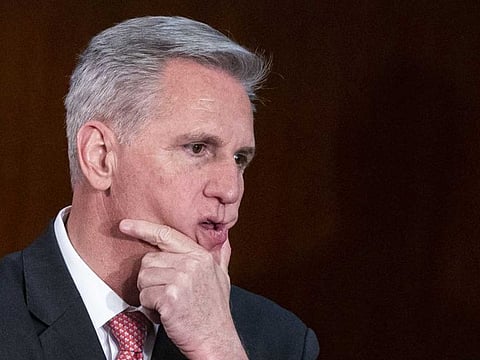Elusive search for US House speaker: McCarthy blocked for 11th time in longest fight since 1859
The stalemate has left House Republicans fractured after they reclaimed the majority

The House voted to adjourn for the day Thursday after Kevin McCarthy was blocked for the 11th time in his bid to become speaker by group of 20 Republican dissidents who have yet to agree on a deal that satisfies their demands.
The stalemate has left House Republicans fractured after they reclaimed the majority in the November election and has stopped all other business in the chamber. McCarthy has tried to break the deadlock by offering significant concessions on House rules that would weaken his power and his ability to control hard-liners in his party, which raise the risk of chaos on issues like the debt ceiling and government spending.
Yet after three days of voting, 20 of 221 Republicans held firm in their opposition to McCarthy, more than enough to deny him the majority he requires to be elected speaker.
Back to back losses
McCarthy's back-to-back losses marked a post-Civil War record for the number of ballots needed to select a speaker. In 1923, Frederick Gillett, a Massachusetts Republican, was elected to the post after nine ballots. The last multi-ballot speaker vote before that was in 1859, when 44 votes were needed.
Only six other speaker elections have taken more than 10 ballots. Election of the speaker is the first order of business for House members, and they can do nothing else until that's done except adjourn.
A group of dissidents most interested in procedural changes has met with leadership and moderates throughout the day Thursday to broker a deal that can earn their votes.
Representatives Chip Roy of Texas, Scott Perry of Pennsylvania and Byron Donalds of Florida are spearheading the negotiations to procedural changes that could earn their votes. They are angling to open up floor procedures to amendment votes, forbidding giant packages of bills and to guarantee conservatives have more seats at the table on key committees.
The talks are being facilitated by Representative Patrick McHenry of North Carolina, the incoming Financial Services chair, as well as the No. 3 Republican Tom Emmer of Minnesota and Jason Smith of Missouri, a contender for the Ways and Means gavel.
Ground zero
As lawmakers plowed through speaker votes on the House floor, Emmer's suite of offices was ground zero for negotiations between McCarthy's emissaries and some of the dissidents.
Representative Scott Perry, chair of the conservative Freedom Caucus, along with Representatives Chip Roy, Byron Donalds and Ralph Norman were among McCarthy opponents frequently ducking in and out. Representative-elect Anna Paulina Luna, a newcomer to the Capitol, relied on reporters to find the right door.
Also in the talks were moderates such as Representative Brian Fitzpatrick, co-chair of the Problem Solvers Caucus, and Dusty Johnson, who heads the Main Street caucus.
Ralph Norman of South Carolina, so far a hard "no" on McCarthy, suggested he could switch his vote if he likes the deal. He's been pushing votes on term limits for lawmakers and a balanced budget, as well as a commitment to use a debt ceiling showdown later this year to cut spending.
Even if McCarthy gets a deal with these members, he could still fall short. Representatives Matt Gaetz of Florida and Lauren Boebert of Colorado are among a small number who appear too dug in to negotiate. That opens up the possibility that the conservative Freedom Caucus get the changes they demand in exchange for another establishment candidate like Majority Leader Steve Scalise or Emmer.
One McCarthy ally suggested the haggling may extend through the weekend.
"We're putting meat on the bones today," Fitzpatrick said. "It's got to be a whole new rules package" and members should get 72 hours to read and digest it.
Still optimistic
McHenry left closed-door talks late Thursday afternoon saying he was optimistic of getting a deal to secure McCarthy's bid for speaker.
"I think we have the right contours that enable us to get Kevin McCarthy to have a majority vote," McHenry said.
McCarthy has offered a group of dissidents one of their biggest demands: lowering the threshold to bring a motion to oust a speaker to just one lawmaker, a person familiar with the talks said.
Under current parliamentary rules, it would take half of the House GOP to forward such a motion to remove the leader. Changing that to just one lawmaker would leave the speaker, the second-in-line to the presidency, facing potential repetitive attempts for removal.
The most hardcore dissidents have not been part of the latest horse trading, however. They include Gaetz and Boebert, as well as Andy Biggs of Arizona and Bob Good of Virginia. Matt Rosendale of Montana and Eli Crane of Arizona are also part of that group. It would take only five opponents to continue to block McCarthy.
"We need to get to a point where we start evaluating what life after Kevin McCarthy looks like," Boebert said on the House floor as she nominated Representative Kevin Hern of Oklahoma as an alternative to McCarthy.
McCarthy had said earlier Thursday that he didn't expect many votes would change but the two sides are still talking. The latest concessions show that, if he succeeds, he's paying a steep price.
In 2015, a motion to vacate was filed against Speaker John Boehner, a Republican who resigned from office before the vote was held.
McCarthy has also offered to meet demands to seat some far-right conservatives on plum committees, including at least two of them on the House Rules Committee; they had been seeking four.
In addition, additional budget and appropriations changes are being discussed, along with specific subcommittee chairmanships. Those changes will be difficult for appropriators "- some of McCarthy's biggest supporters "- to swallow.
Sign up for the Daily Briefing
Get the latest news and updates straight to your inbox



